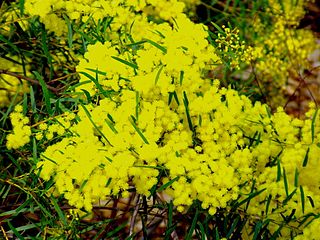
Acacia fimbriata, commonly known as the fringed wattle or Brisbane golden wattle, is a species of Acacia that is native along much of the east coast of Australia.
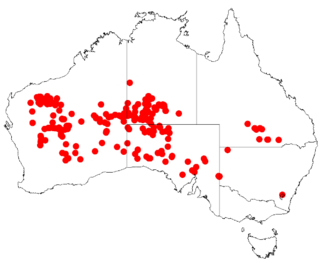
Acacia ayersiana is a plant that grows in arid areas of Australia.

Acacia howittii, commonly known as sticky wattle or Howitt's wattle, is a tree species that is endemic to Victoria, Australia.

Acacia cremiflora, is a small wattle plant occurring in parts of inland New South Wales. It may be seen growing near Orange and Yerranderie. It was first collected on 15 May 1972. The attractive yellow or cream flowers may appear at any time of the year.

Acacia clelandii, also known as umbrella mulga, is a shrub belonging to the genus Acacia and the subgenus Juliflorae that is native to arid parts of central Australia.

Acacia heteroneura is a shrub belonging to the genus Acacia and the subgenus Juliflorae that is endemic to western Australia.

Acacia thomsonii, commonly known as Thomson's wattle, is a shrub or tree belonging to the genus Acacia and the subgenus Juliflorae that native to parts of northern Australia.

Acacia dictyophleba, also known as the sandhill wattle, waxy wattlefeather veined wattle, and spear tree, is a shrub belonging to the genus Acacia and the subgenus Phyllodineae. The Nyangumarta peoples know the plant as Langkur or Lungkun; the Thalanyji know it as Jabandi; and the Pintupi know it as mulyati.
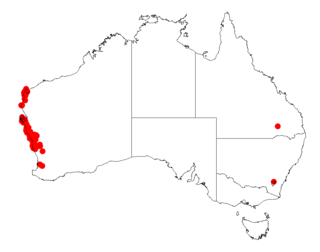
Acacia spathulifolia commonly known as Gold carpet or the Gold carpet wattle is a shrub of the genus Acacia and the subgenus Phyllodineae that is endemic to coastal parts of western Australia.
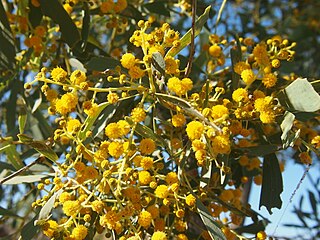
Acacia hemignosta commonly known as the clubleaf wattle, is a tree or shrub of the genus Acacia and the subgenus Plurinerves that is endemic to northern parts of Australia.

Acacia uncinata, commonly known as gold-dust wattle or round-leaved wattle, is a shrub belonging to the genus Acacia and the subgenus Phyllodineae that is native to parts of eastern Australia.

Acacia alcockii, also known as Alcock's wattle, is a shrub belonging to the genus Acacia and the subgenus Phyllodineae endemic to South Australia.

Acacia crombiei, commonly known as pink gidgee, is a shrub belonging to the genus Acacia and the subgenus Phyllodineae that is native to central Queensland.
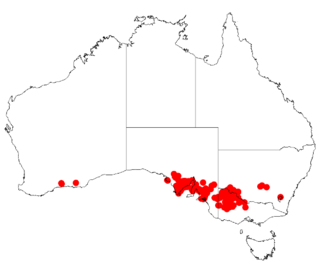
Acacia halliana is a shrub belonging to the genus Acacia and the subgenus Phyllodineae that is native to parts of south eastern Australia.

Acacia handonis, commonly known as Hando's wattle or Percy Grant wattle, is a shrub belonging to the genus Acacia and the subgenus Phyllodineae that is native to parts of north eastern Australia. In 2008 it was listed as vulnerable according to the Environment Protection and Biodiversity Conservation Act 1999.

Acacia obtusata, commonly known as blunt-leaf wattle or obtuse wattle, is a tree or shrub belonging to the genus Acacia and the subgenus Phyllodineae native to eastern Australia.
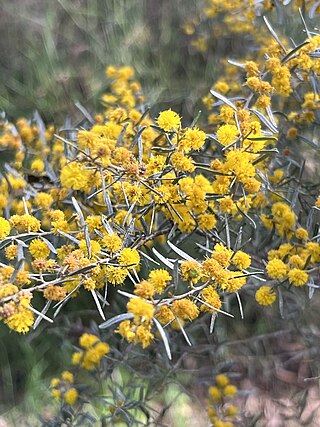
Acacia wilhelmiana, commonly known as dwarf nealie, Wilhelmi’s wattle and mist wattle, is a shrub belonging to the genus Acacia and the subgenus Plurinerves native to the mallee region of central and eastern Australia.

Acacia nana, also known as the small red-leaved wattle, is a shrub belonging to the genus Acacia and the subgenus Phyllodineae where it is endemic to eastern Australia.

Acacia simmonsiana, commonly known as Simmons wattle or desert manna wattle, is a shrub belonging to the genus Acacia and the subgenus Phyllodineae native to south eastern Australia.

Acacia microcarpa, commonly known as manna wattle, is a shrub belonging to the genus Acacia and the subgenus Phyllodineae endemic to south eastern Australia.





















